If you’ve been on social media the last few months, there’s no doubt you would have heard about the several sexual assault cases being brought to light through Instagram, Twitter, and the likes. There’s also no doubt you’ve heard of the Instagram account “Assault Police” who played a huge role in the Ahmed Bassam Zaki case. What you may not know however, is much about the woman behind the screen, Nadeen Ashraf. The account has now expanded as a platform to voice general concerns about sexual violence as well as to educate and provide resources.
As these events unfolded, many people became curious to the identity of Assault Police – when Ashraf decided to reveal her identity after a short hiatus, many of us were in awe of the work and role that just one young woman has played in catalyzing what some have called a “digital feminist revolution” or “Egyptian #MeToo” movement. I was shocked to discover that I, myself, knew Ashraf because the amount of work required to run this page seemed like it would require a whole collective of people. I decided to speak with Ashraf to know more about who she is and what Assault Police means to her.
View this post on Instagram
Who are you? Tell me a little about yourself.
My name is Nadeen Ashraf and I’m a 22 year old philosophy student who’s probably a lot more vocal on social media than I should be. I’ve been active on social media since I was 9 years old, and I’ve been an avid follower of internet trends and social media for as long as I can remember. Yahoo! Answers, Tumblr, the early days of memes when they called “rage comics”, Vine, you name it. If it was ever an internet sensation, I was definitely there.
I was certainly exposed to more mature parts of the internet at a younger age than normal, but in retrospect I think that helped nurture a fuller understanding of the world for me. I’ve been passionate about worldwide political and social issues since I was young, but I think that’s pretty obvious to most people at this point!
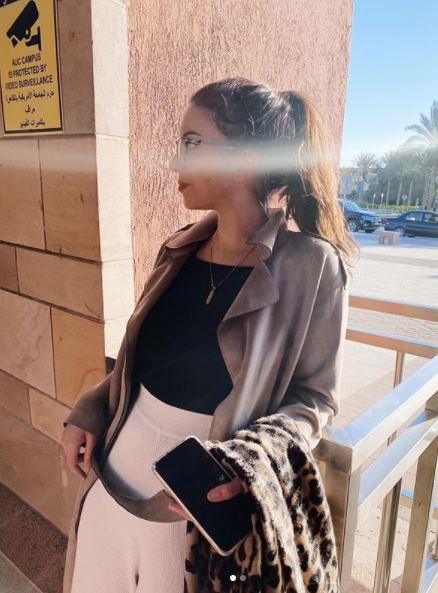
Why did you decide to start Assault Police initially? What encouraged you or sparked it?
I created Assault Police overnight because of my growing frustration with people’s voices not being heard or taken seriously. My generation often takes credit for jump-starting change all over the world, but I kept seeing this gap within my community of young women trying to speak out against sexual harassment, and never being taken seriously. Sexual violence has been so normalized in our culture for years, that it is often seen and framed as mere “uncomfortable situations” within our social circles.
Many people don’t actually realize how criminal sexual harassment is because of the years we’ve spent internalizing daily catcalls, almost growing immune to the anger it brings and the violence they encourage. But when you step back for a second, look at the bigger picture, and realize that this is a social disease that has slowly infiltrated our lives and thrived on our silence, you begin to realize you need to start a conversation to fight it. So that’s what I did – I started a conversation.
I had heard of (and confirmed) that students mobilized and tried reporting Ahmed Bassam Zaki to their school administration, but those in control failed them by not taking proper action. I witnessed women first coming forward about being harassed by him on our university’s unofficial Facebook group around 2018, only to be silenced by having their posts deleted later.
The last straw was when a classmate tried to post about it earlier this year on her personal social media account, in order to avoid having her post deleted, and yet she was threatened with legal action by the perpetrator’s family, and still had to delete it. I grew extremely frustrated at the adults in our community and their irresponsible blatant disregard of our voices. And so naturally, like many of those in my generation often do, I took my frustrations to Instagram.
Were you surprised by the reactions and how quickly the campaign against Ahmed Bassam Zaki and Assault Police grew?
I was definitely taken aback by how quickly the campaign grew and how seriously it was taken. It truly healed this sense of hopelessness I had always felt about the sexual violence in my community, and I began to think that maybe we just never confronted the issue correctly in our society. I certainly had no idea the account would expand to be what it is today, I initially expected it to get reported and shut down by Instagram within days of its creation.
The fact that it lasted beyond two days was already a milestone for me! It was just this thing that I created at 4 in the morning in a state of deep-anger, frustration, and sleep-deprivation. I don’t think I expected anything when I woke up the following morning, I definitely had no idea it would take me to where I’m at right now.
Is this the start of significant change in Egypt, in your opinion? If so, why?
I definitely think so- I think my generation is certainly more vocal than many before it about socially sensitive issues, all over the world. Sexual violence has always been taboo in our society, and I think that the way recent cases have been talked about definitely broke the ice. People are no longer afraid to talk, and this is the long-term effect that I’m most grateful for. I’m eternally grateful for every person that has engaged with Assault Police as it was still growing, but I’m even more grateful for the conversations that have been ignited within families, friends, educational institutions, and workplaces because of this movement.
I also started to see so much support from well-respected people and institutions, such as Al-Azhar. The speed at which Al-Azhar released a supportive statement definitely legitimized the movement for so many people, and more importantly further encouraged women to speak out against sexual harassment and assault.
Some people would argue that Instagram is quite limited in the impact it can have (e.g. it’s only for a certain group). Do you agree?
It would be foolish to deny that Instagram can only go so far in terms of segments of the population, but like I mentioned before, I’m more grateful for the conversations that have been ignited outside of social media as a result of this movement. I definitely plan on further expanding my efforts outside of Instagram so I can potentially reach a wider audience. I started with Instagram simply because I wanted to do something with the limited resources I had as an undergraduate student.
What happened a few weeks ago when you decided to deactivate your page? What made you decide to make a comeback?
First & foremost, my top priority has always been the mental health, comfort, and safety of any survivor. I deactivated after I realized that the Fairmont case was quickly growing rapidly in the media. I feared that this was going to backfire and hurt the case for the survivors, since everything was spiralling out of control before they could file official reports with the National Council for Women.
At the same time, I was getting numerous threats from anonymous accounts, that I never really took seriously until after this case. I wanted to make sure that the necessary legal steps were taken and that the appropriate authorities were informed of everything related to the case before I could carry on a social-media campaign. When you’re on the outside, it’s easy to forget that such high-profile cases are a police-matter, and that the purpose of drawing public attention to a case is to encourage all relevant parties to cooperate for the authorities to investigate.
Sometimes, social media pressure can actually obstruct the legal process, which was honestly a very difficult concept for me to understand initially. However, when I was assured by the National Council for Women that all the necessary legal steps concerning the case had been taken, and that the survivors and their identities were safe, I felt like it was time to resume what started on social media.
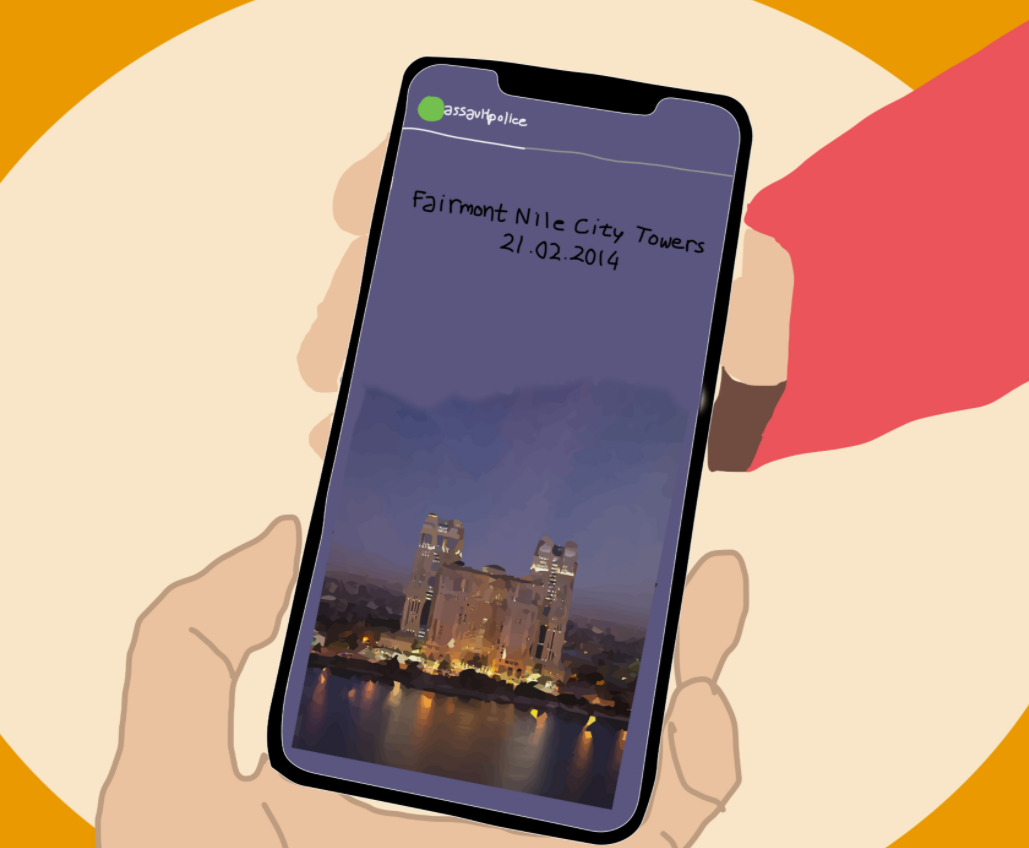
Did you find that government support was accessible?
I was genuinely surprised at the speed at which governmental efforts were made to support survivors. The new law amendment that was approved by Prime Minister Moustafa Madbouly was a clear sign of encouragement and support of the movement.
Many people are concerned that the available hotline for sexual-violence complaints and the National Council for Women have not always been available. Rightfully so, but I think that this is simply because no institution was ready for the sudden overflow of survivors coming forward! Although it’s certainly something to work on, I think it’s a positive sign of just how many more people are now empowered enough to confront these issues.
When you re-activated, you chose to reveal your identity- what made you decide to do this?
To be perfectly honest, I wasn’t exactly careful to protect my identity when I first created the page, simply because I expected it to get shut down almost immediately after! Because of how sloppy I was with who knew I was behind the page and who didn’t, word spread, and eventually, tens of people knew who I was. When sensitive cases started coming up, I was afraid my identity would reach the wrong people and I could be harmed, especially with the numerous threats I was getting at the time.
Beyond this, I saw that smear-campaigns began to emerge, claiming Assault Police was a foreign-funded organization making up false allegations just to steer controversy, and reducing the movement to conspiracy theories. I felt like coming forward would help address these issues, and also wouldn’t have me living in fear of being known only to people who want to harm me. I also think it was the right move to make in terms of potentially expanding Assault Police into an organization rather than just an online platform.
How do you authenticate messages/submissions and in general, any other information you receive?
Well, I never explicitly identified predators other than with the Ahmed Bassam Zaki case, and this was because I was friends with several of the survivors for years and could personally attest to the validity of many of their testimonies. Otherwise, I’m focusing on sharing people’s experiences without necessarily naming or identifying anyone, purely for the awareness factor it encourages. I also then refer the survivors to any appropriate channels they seek, such as therapy or legal aid.
View this post on Instagram
What has been the hardest part of managing the page?
The constant criticism. If there’s one thing I’ve learned along this journey, it’s that even if I pour my heart out and sacrifice all I have, I will still face a certain level of criticism that I’m not doing enough. I’ve had to come to terms with the fact that I will always have people criticizing my every move, statements, or even approach in general.
People have a hard time realizing that a lot of work goes on behind the screen, and it’s really easy to call others out on not doing enough, but they never know how calculated social media strategies need to be, and how at risk you constantly are with such a large platform with all eyes on you. At first I was angry, but I’m starting to understand it often comes from a good place, a place of concern and yearning to do more themselves. I always try my best to not be irrational and to consider other people’s point of view.
Running Assault Police sounds extremely mentally and emotionally taxing. How are you holding up and how have you been coping?
It really is! A lot of the stories I deal with can be really intense and triggering, but I like to always remind myself that if it’s heavy for me to read, it’s infinitely heavier for the survivor to have experienced and to share. It’s my moral duty to listen, learn, and try to derive meaning, so as to avoid similar situations from occurring in the future.
Do you feel like you have a support system?
I always thought I could confide and be supported by my close friends, but this belief betrayed me over the last few months. I definitely learned a lot about the people around me from the way they reacted to what I went through lately, and I was disappointed in some people who were close to me. I’m lucky to have such a supportive family that stood by my side and emotionally lifted me when I felt disappointed from other people in my life.
I want to put a message out there for anyone striving for change like me: if and when it happens, you may be disappointed by some people you never expected to betray your trust, and that’s okay. Not everyone is built for handling intense situations, and it’s never your fault for not knowing beforehand. We learn through experiences like this.
What’s next for Assault Police?
I’m currently working on expanding the team in charge of our social media accounts, so I can work more efficiently with survivors of sexual-violence, provide more support, and work more on awareness content. I want to expand from an online platform to a full-time organization that can support survivors in real-time by connecting them to professionals, legal aid, and therapy. I also plan to look into curating awareness programs for younger generations whether through schools or other institutions, so we can really start to tackle the issue at its core.
You can find Nadeen on social media at:
Instagram: @assaultpolice or @actuallynadeen
For formal inquiries email: [email protected]
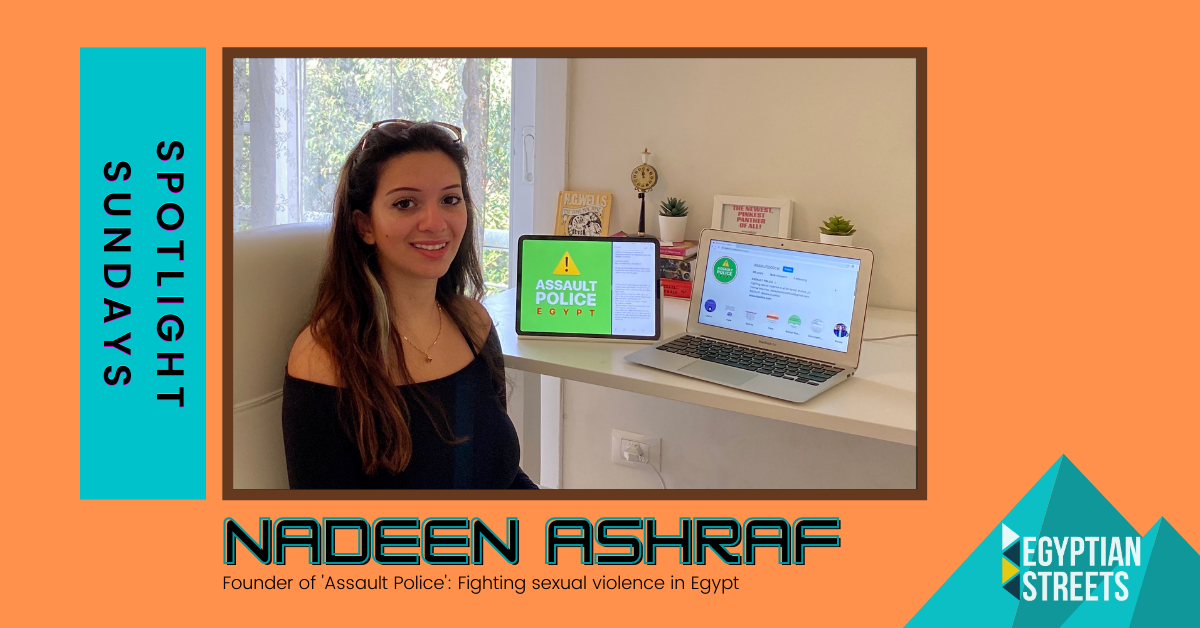



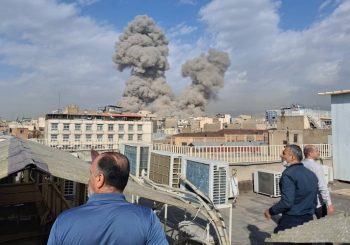
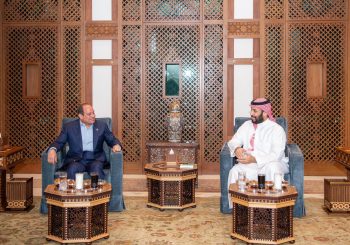
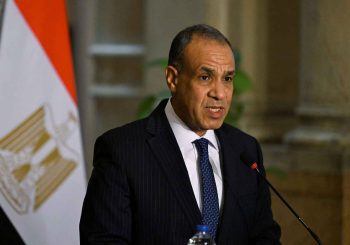
Comments (25)
[…] an interview with Egyptian Streets, Ashraf revealed that she is planning to expand from an online platform to a full-time organization […]
[…] Meet Assault Police’s Nadeen Ashraf: The Student Behind Egypt’s Anti-Harassment Revoluti… […]